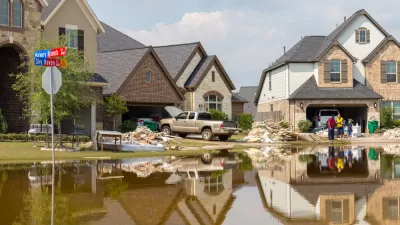With the National Flood Insurance Program deeply in debt, homeowners are struggling to afford new insurance rates resulting from legislation passed in 2012. The House could still block the Senate bill that would delay more rate increases.
Since the Biggert-Waters Flood Insurance Reform Act of 2012 ended subsidies that held down flood insurance rates for more than a million homeowners across the United States, homeowners around the country have struggled to adjust to the resulting rate increases.
According to an article by Ramsey Cox, the Senate is proceeding with legislation that will delay a required increase in flood insurance premiums.
“The bill delays a required increase in flood insurance premiums for some homes, and would allow homeowners to maintain existing flood insurance subsidies even after their homes are sold.” Supporters of the bill say these changes are needed while the government studies whether homeowners can afford these higher costs.
“The bill would delay this trigger until the Federal Emergency Management Agency (FEMA) does an affordability study. FEMA would also have to certify that its flood maps are accurate — a process that FEMA has said could take three years.”
But like most federal legislation, the Senate version is expected to meet resistance in the House: “With nine Republican cosponsors, the legislation is expected to pass in the Senate, but it’s unclear if Speaker John Boehner (R-Ohio) will allow a vote in the House.”
FULL STORY: Senate begins amendment process on flood insurance

Alabama: Trump Terminates Settlements for Black Communities Harmed By Raw Sewage
Trump deemed the landmark civil rights agreement “illegal DEI and environmental justice policy.”

Study: Maui’s Plan to Convert Vacation Rentals to Long-Term Housing Could Cause Nearly $1 Billion Economic Loss
The plan would reduce visitor accommodation by 25% resulting in 1,900 jobs lost.

Why Should We Subsidize Public Transportation?
Many public transit agencies face financial stress due to rising costs, declining fare revenue, and declining subsidies. Transit advocates must provide a strong business case for increasing public transit funding.

Paris Bike Boom Leads to Steep Drop in Air Pollution
The French city’s air quality has improved dramatically in the past 20 years, coinciding with a growth in cycling.

Why Housing Costs More to Build in California Than in Texas
Hard costs like labor and materials combined with ‘soft’ costs such as permitting make building in the San Francisco Bay Area almost three times as costly as in Texas cities.

San Diego County Sees a Rise in Urban Coyotes
San Diego County experiences a rise in urban coyotes, as sightings become prevalent throughout its urban neighbourhoods and surrounding areas.
Urban Design for Planners 1: Software Tools
This six-course series explores essential urban design concepts using open source software and equips planners with the tools they need to participate fully in the urban design process.
Planning for Universal Design
Learn the tools for implementing Universal Design in planning regulations.
Smith Gee Studio
Alamo Area Metropolitan Planning Organization
City of Santa Clarita
Institute for Housing and Urban Development Studies (IHS)
City of Grandview
Harvard GSD Executive Education
Toledo-Lucas County Plan Commissions
Salt Lake City
NYU Wagner Graduate School of Public Service



























